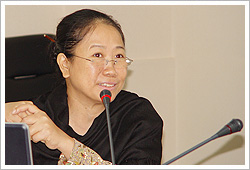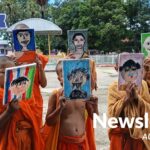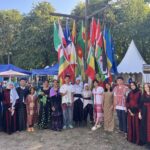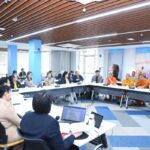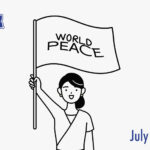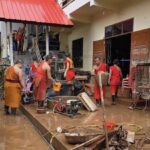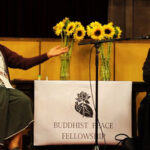?Women and spiritual movement for social Justice and Peace?
As part of TICD Inter-religious Dialogue Program
February 23, 2006
Roi Chanum Building, 666 Charoen Nakorn Road, Klong San, Bangkok
RESOURCE PERSONS:
 1. Ms. Naree Charoenponpiriya (Buddhist)
1. Ms. Naree Charoenponpiriya (Buddhist)
(National Reconciliation Commission – NRC)
2. Ms. Siriporn Lertthanongsak (Catholic)
(Network of Women for Peace)
3. Mrs. Soraya Chamchuri (Muslim)
(Committee for healing of women relatives of victims of violence in the southern region)
. Ms. Pailin Chotesakulrat, moderator
SPECIAL GUESTS:
A group of Muslim women from Pattani and Narathiwas provinces who lost their families members from violence and disappearance in the south. (They are part of the healing program by Mrs. Soraya)
SUMMARY OF DISCUSSION
The seminar started with Ms. Siriporn?s presentation. When she was young, she was puzzled by the teachings saying that the good but non-catholic person cannot go to heaven after death. Since then, she developed inquisitive habit and kept searching for the meaning of life according to her religion. Despite studying in a catholic school, she still belonged to the minority because many friends are Buddhists. She would like to know how to live happily with Buddhists and members of other religions.
Another concern of hers was the fact that there is discrimination against women in all religions. She would like to bring forward the dignity of religious women and their capacity to contribute to social peace and justice. She used to work with Catholic Committee for Women. Now she is a part of the Network of Women for Peace that works for the women who suffer from the lost of family members from the violence and disappearance in the south. Her work is to provide healing services to them.
From her work, she was impressed by beautiful spirit of women ? mothers and wives ? who remain hopeful for the future for their living children. Normally, Muslim women are housewives, but now they have to shoulder the burden as the head of the family. She tried to create trust and friendship with them, listen to them and provide moral support. The strength from joining as a group is another impressive feeling. All of her experience is about friendliness, faithfulness, hope and courage to fight against sorrow of the ordinary, poor women both at individual and group level.
To her, the spiritual movement does not mean the call from religious leaders to demonstration or to social development projects. But it is the time when one listens to one?s own inner voice that pushes one to be with other people, to resurge from hopelessness and be brave to face problems. Then, from one?s individual effort, it becomes stronger when people start to share their effort.
Ms. Naree made the second presentation. To her, woman?s nature is a home or a fertile land of spirituality. Woman?s nature is inclined toward the deep understanding of spirituality. They are the ones who usually use religious teachings when dealing with problems. She raised several examples and also compared between Buddhist and Muslim teachings.
As one example, about the death of her dear one, a Muslim woman in the south may say ?that person runs out of foodstuff? that means life is no more according to God?s will. The Buddhist talked about the depletion of merit from the previous life. Such knowledge does not create hatred or ill will. Another example is the comparison between Muslim praying and Buddhist mindfulness. They are similar in the sense that in order to achieve the highest goodness, one needs to get rid of one?s self. Then, the idea that both happiness and suffering are valuable is similar. For Buddhists, suffering leads one to the path of dhamma practice. While Muslim says that the suffering is given by God as a test.
Since Ms. Naree works with good understanding on the Muslim women, she was asked whether she would change her religion. She told them that, the more she becomes a good Buddhist, the more she is a good Muslim. And similarly the more the Muslim are good Muslim, the more they are good Buddhist. Because once one progresses in the spiritual path, ones would transcend words and get the essence that humanity is one. Therefore, when a Buddhist meets a serious Islam practitioner, he/she should joyful rather than be suspicious that this Muslim is the so-call violent fundamentalist.
Mrs. Soraya Chamchuri, a Muslim university teacher from Songkhla province, also mentioned about the life that is tested by God. She said that not only suffering is the test, so is happiness. God gives happiness to some Muslims to see whether they would forget God and the task to share their prosperity with other or not. For the Muslim wives and mothers, the lost of family members is the test. They must pass the test with ?patience? which is one of Islamic teachings. Patience is not only for lost. It is also to deal with hatred and anger.
In reply to the popular comment that women turn to religion when they fail in family life or have broken heart, Naree said that even that is also a blessing. She said that it is much better that women turn to religion than drinking. In Buddhism, there are many women who attained highest liberation who previously were prostitute, raped, murderer, insane, etc. That means, all people have capacity and rights to develop their spirit to the highest level without any exception or limitation.
The three resource persons are always questioned why they help the family of the terrorists. Naree respond that for the Buddhist, there is no limitation for a person to develop their spirit, then there is no reason to discriminate even against those who commit violence. Soraya said that according to Islam, all Muslims are parts of one body. If one part hurts, all other do as well. She would like to extend such idea to that all humanity is parts of one body.
Secondly, Soraya said that the family members of the so-call terrorists are innocent. However, even the Muslim in the south commit violent acts, they do out of the long-time pressure from ignorance, injustice and discrimination by the people from government sector, as if they are not Thai citizens. If she and her friends do not help, it is as though they are also denied by her. Then that would be double punishment.
After the presentation, the group of Muslim women from the south shared their sorrow and difficulties from the death and disappearance of their family members. Many of them are poor but have to feed their five to six children. Many of them cannot reveal their true identity for the fear of government agencies. They also shared about the discrimination in getting help or employment opportunity from government because of their being a woman, religion, low education and poverty. Toward the end of the program, there was open dialogue among participants. Most of questions were about the life of women as a member of one?s own religion and situation in the south.

